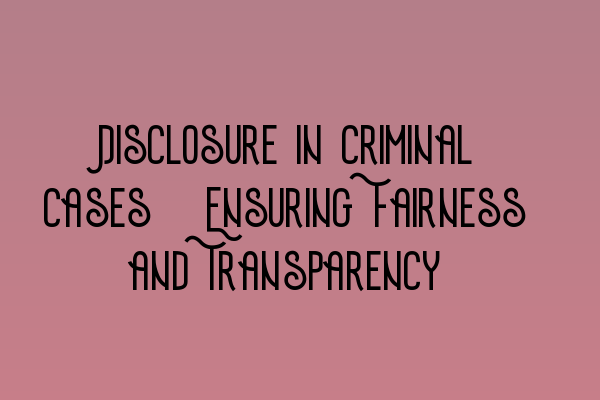Disclosure in Criminal Cases: Ensuring Fairness and Transparency
In criminal proceedings, the concept of disclosure plays a pivotal role in upholding the principles of fairness and transparency. It refers to the process by which the prosecution discloses all relevant evidence to the defense, allowing the accused to present an effective defense.
At SQE Criminal Law & Practice Law UK, we understand the critical importance of disclosure in criminal cases. We are dedicated to ensuring that our clients receive a fair trial, with access to all necessary information. In this blog post, we will delve into the nuances of disclosure, why it is crucial, and how it impacts the overall criminal justice system.
Why is disclosure important?
The principle of fairness lies at the heart of criminal proceedings. It is paramount that both the prosecution and the defense have access to all relevant evidence. Failure to disclose vital information may result in wrongful convictions, undermining the integrity of the justice system.
Disclosure is not limited to evidence that supports the prosecution’s case. It encompasses any material that could assist the defense in challenging the prosecution’s case, undermining witness credibility, or identifying alternative suspects. Full disclosure ensures that all parties are on an equal footing, promoting a fair trial.
The role of the prosecution in disclosure
As the prosecution, it is essential to fulfill your obligations regarding disclosure fully. This responsibility involves identifying and preserving all relevant evidence, including both inculpatory and exculpatory material. Inculpatory evidence tends to establish guilt, while exculpatory evidence tends to establish innocence or raise reasonable doubt.
The prosecutor must make reasonable efforts to locate and disclose this evidence to the defense. This includes obtaining statements from witnesses, police reports, laboratory reports, and any other relevant records. It is crucial to document the disclosure process to demonstrate compliance with disclosure obligations.
The defense’s right to disclosure
On the other side of the aisle, the defense has the right to receive full disclosure of all relevant material. The defense must be aware of the case they are facing to mount a proper defense. Without complete disclosure, the defense may be unfairly handicapped, potentially leading to wrongful convictions.
Defendants have the right to review and analyze the disclosed evidence, consult with experts, and organize their defense strategy accordingly. It is essential to establish open lines of communication with the defense and provide ongoing disclosure throughout the case, especially if new evidence comes to light.
Potential challenges in disclosure
Disclosure is not without its challenges. Factors such as the sheer volume of digital evidence, complex data, or issues related to national security may present obstacles in the disclosure process. Ensuring prompt and effective disclosure in such cases often requires the expertise of legal professionals and the efficient use of technology.
Addressing these challenges requires a proactive approach from both the prosecution and the defense. Open communication, cooperation, and adherence to disclosure rules are vital to overcome these hurdles and promote fairness in criminal proceedings.
Improving the disclosure process
To ensure fairness and transparency, it is imperative that the criminal justice system continues to evolve and improve its disclosure processes. Leveraging technology can aid in streamlining the handling of large volumes of evidence. Machine learning algorithms can assist in identifying pertinent material, reducing the chances of crucial evidence being overlooked.
Regular training and education should be provided to all legal professionals involved in the disclosure process. This would update their understanding of evolving disclosure duties and obligations, ultimately benefiting the overall administration of justice.
Conclusion
Disclosure in criminal cases is a fundamental aspect of ensuring fairness and transparency. It is crucial for both the prosecution and the defense to observe their disclosure obligations fully. Upholding these principles strengthens the integrity of the criminal justice system and promotes trust and confidence in its proceedings.
At SQE Criminal Law & Practice Law UK, we are committed to advocating for our clients’ rights and providing them with a fair trial. Our experienced solicitors understand the complexities of disclosure in criminal cases and work diligently to ensure that all material evidence is disclosed, allowing for a comprehensive defense. Contact us today for expert legal guidance and representation.
